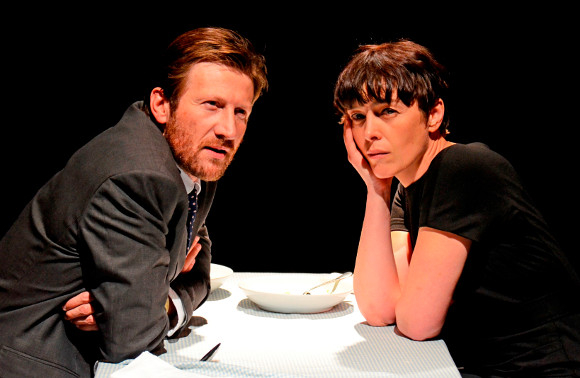Scenes from a Marriage

"I live a good life, I like my life" one character tells another in the opening moments of Trevor Nunn's stage version of Ingmar Bergman's film. It's pretty clear that things aren't going to stay that way for long.
Any play about marriage or relationship problems is likely to resonate with an audience. And writer Joanna Murray-Smith duly induces a good few laughs of recognition. But her adaptation lacks the delicacy of her under-rated play Honour or the wit of her more recent Female of the Species.
It's hard to care about the central couple's numerous rows and infidelities when one never really liked them to start with. Mark Bazeley's Johan is variously vain, inconsiderate, unfaithful, drunk and violent – not an appealing cocktail of characteristics. Meanwhile Olivia Williams' affectingly vulnerable Marianne has more than a hint of doormat about her, which is easy to understand but hard to admire.
In the second half the performances find a volume quite out of scale with the piece or the attractive St James Theatre, with no end of table slamming, sofa punching and at one point a rather poorly executed stage fight. Murray-Smith's script goes for a few too many sharp gear shifts and extended metaphors to quite find the naturalism that would serve it best (it might help if characters spent less time addressing each other by their names).
The design by Robert Jones is gorgeous (the props buyer deserves a curtain call of her own) but the amount of time and effort spent scene shifting (taking up 20 minutes of the two-and-a-quarter hour stage time) feels like a heavy price to pay for it as the momentum of the play is so frequently interrupted – a shortcoming which a selection of PowerPoint home movies does little to minimise.
The music by Roger Eno (whose programme biography describes him as "hard to pin down and slippery as a fish") is frustratingly watery too. One wishes that Nunn had given the show more of the flair for which he is so well known, such as he did for Pinter's Betrayal a few years ago at the National. That too explored a dysfuntional relationship but with a style that was much more theatrically fluid and emotionally engaging.
"We loved the best we can," says the (often named) Johan in the last scene. This is perhaps the central theme of the play, and the needs and limits of love will always engage an audience, as it does here thanks to the detail bestowed on the central pair by Nunn. But unfortunately, like the relationship at the centre of the story, the show overall feels like it offers diminishing returns.










